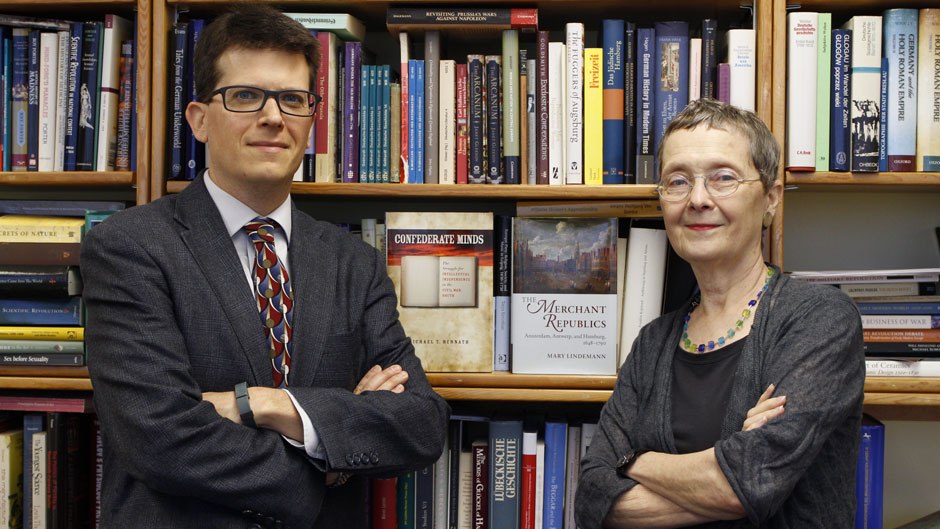Two University of Miami College of Arts & Sciences faculty members and colleagues in the Department of History, Michael Bernath and Mary Lindemann have been awarded National Endowment for the Humanities (NEH) Fellowships for 2017.
Bernath is the Charlton W. Tebeau Associate Professor of 19th Century American history, and Lindemann is the chair and professor of early modern German, Dutch, and Flemish history and medical history in the early modern world. They will use their awards for book projects on the Northern Teachers in the Old South and on the aftermath of the German Thirty Years War, respectively.
“We are proud and excited that two of our distinguished History professors in the College of Arts and Sciences were awarded NEH fellowships, a tremendously respected award in the humanities,” said Leonidas Bachas, dean of the College of Arts & Sciences, “Awards such as these not only promote scholarship in the humanities, but also lead to knowledge shared with our students seeking a deeper understanding of the human experience. The UM Center for the Humanities provides funding to enable these research ideas to reach the stage of NEH support.”
The UM fellowships were among $16.3 million in grants awarded nationwide by the NEH for 290 projects. The Fellowship for University Teachers’ program supports college and university teachers pursuing advanced research. This year the NEH received 1,298 applications and funded 86 of the total, approximately 6.6 percent of the proposals, making the fellowships among the most competitive humanities awards in the country.
Bernath’s project, “In a Land of Strangers: Northern Teachers in the Old South, 1790-1865,” looks at the experiences, reception and perception of thousands of Northerners, both men and women, who came south to teach throughout the southern states. Bernath argues that the presence of these northern teachers represented the most intimate, sustained and widespread contact point between northerners and southerners during the Antebellum period. He begins here to examine when, how, and where ideas of northern and southern identity emerged.
“Given how difficult it is to win an NEH award, I’m honored to be one of two faculty members in the same department and university, a highly unusual occurrence. The NEH plays an essential role in facilitating ground-breaking research and the exploration of vital issues that benefit us, not only as scholars and universities, but also as a society,” said Bernath.
Lindemann’s project, “Fractured Lands: Northern Germany in an Age of Unending War, 1627-1721,” analyzes the effects of the Thirty Years War on Germany for a century after the conclusion of peace. The project is innovative in the sense that it looks not only at political and social development but also considers the impact of the war on the environment.
“Such NEH grants have been critical in my career. Previously I received a NEH Travel to Collections grant and then a similar NEH University Teachers award which directly led to the publication of two books, the first with John Hopkins University Press in 2006 and the second with Cambridge University Press in 2015. The time needed to do deep archival research and write is absolutely critical for scholars employed at major universities. I’m grateful for the support of the NEH and UM’s College of Arts & Sciences. In a political climate where the NEH is in danger of being either eviscerated or eliminated it is important to emphasize how valuable it is for sustaining and nurturing high quality scholarship throughout the U.S.,” said Lindemann.
The National Endowment for the Humanities is an independent federal agency and one of the largest funders of humanities programs in the United States.

